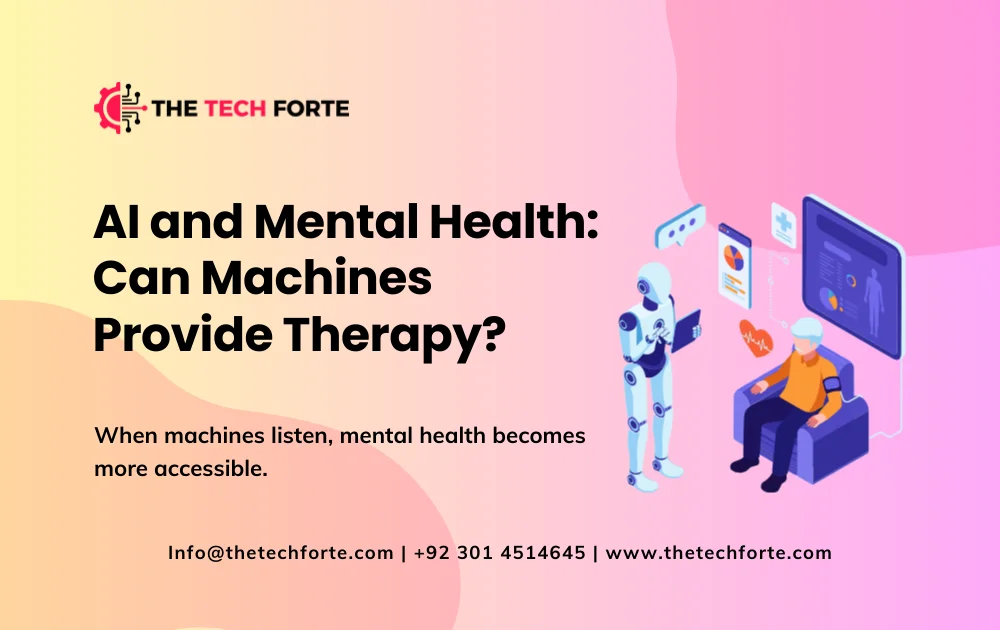Artificial Intelligence (AI) is rapidly transforming the landscape of mental health care. From diagnosis and monitoring to therapy and counseling, AI-driven tools offer new pathways for support, scalability, and personalization. But can machines truly replicate the nuance, empathy, and complexity of human therapy? As scientific, clinical, and ethical debates intensify, the question becomes not just whether AI can provide therapy, but whether it should.
This article examines the evolving role of AI in mental health, ranging from diagnostic systems and chatbots to therapeutic assistants and research tools. We’ll examine the promise, limitations, current applications, and future trajectories of AI and mental health care, drawing on narrative reviews, systematic studies, and policy conversations.
Recommended Read: The Role of AI in Mental Health Therapy
The Promise of AI in Mental Health
Early Detection and Diagnosis
One of the most powerful applications of AI and mental health diagnosis lies in early detection. A recent systematic review revealed that AI models, particularly those utilizing machine learning, can analyze complex datasets, such as speech patterns, social media behavior, or health records, to flag signs of psychiatric conditions earlier than traditional clinical workflows.
These predictive tools can help clinicians identify individuals at risk and initiate timely intervention, potentially before symptoms escalate.
Continuous Monitoring & Personalized Intervention
AI also helps with AI and mental health care by enabling ongoing monitoring of patients. Rather than relying solely on periodic therapy sessions, AI-powered systems can track behavioral signals, emotional tone, and treatment progress over time.
This continuous feedback loop allows for more dynamically tailored therapeutic strategies: AI can suggest adjustments to treatment plans, remind clinicians of changes, or nudge patients toward healthy behaviors.
Generative AI for Emotional Support
Generative AI models that produce human-like text play a starring role in AI and mental health therapy. Chatbots and “virtual companions” can engage users in therapeutic conversations, using techniques drawn from cognitive-behavioral therapy (CBT), motivational interviewing, or supportive coaching.
One experimental system, Serena, is built on a deep-learning architecture trained on real therapy session transcripts, designed to emulate person-centered dialogue.
This kind of AI and mental health counseling offers an accessible, low-cost option for people who might otherwise lack access to human therapists.
Supporting Human Therapists
AI isn’t just replacing human labor; it’s also augmenting it. An AI-assisted platform developed for care providers demonstrated that AI can suggest empathic responses, reduce response times, and improve adherence to therapeutic protocols.
In other words, AI and mental health care can support therapists by handling administrative burden, offering real-time decision support, and helping deliver consistent, evidence-based care.
Promoting Healthy Emotional Regulation
According to a narrative review of AI in positive mental health, AI tools can aid in emotional regulation among individuals with mood disorders, schizophrenia, or autism spectrum conditions.
By guiding users through cognitive exercises, recommending coping strategies, or simply offering empathetic conversation, AI has the potential to contribute positively to mental well-being even beyond clinical therapy.
Suggested Read: Men’s Mental Health Month 2025: How to Support the Men in Your Life
Four Practical Ways AI Is Improving Mental Health Therapy
Based on expert analyses and real-world implementations, there are four particularly significant ways in which AI and mental health therapy intersect meaningfully:
Quality Control and Therapist Training
With rising demand for mental health services and stretched clinician capacity, AI is being used to assess therapy session quality. Natural Language Processing (NLP) tools can analyze therapists’ language, detect patterns, and offer feedback to improve quality. The UK-based clinic Ieso, for example, uses AI to analyze session transcripts, giving therapists insights into how to refine their approach.
By providing this kind of objective analysis, AI supports training and ensures consistent standards of care.
Refined Diagnosis & Matching
AI can help refine mental health diagnoses by identifying subtle subtypes of disorders. According to research, machine learning can analyze large volumes of patient data to detect symptom clusters and suggest which therapy modalities may work best.
Moreover, AI systems can match patients with the therapists whose style or methods are most aligned with their needs, optimizing both effectiveness and patient satisfaction.
Monitoring Progress and Adjusting Treatment
AI-driven monitoring enables more responsive care. By continuously analyzing behavior data, voice tone, or self-reported mood, AI can flag when patients might benefit from a change in therapy intensity or method.
This means treatment is not static: with tools like wearables or in-app assessments, AI can alert providers when intervention should be adapted.
Extending Support Outside the Clinic
AI-powered tools don’t just operate during therapy; they can support patients around the clock. Generative chatbots can deliver therapeutic exercises, validate emotional experiences, or offer coping strategies between sessions. Wearable data (sleep, heart rate) can also feed into this support ecosystem. This blend of real-time empathy and data-driven guidance offers a powerful complement to in-person care.
Research Landscape: What the Science Says
Positive Mental Health & Emotional Regulation
A narrative review published in Frontiers in Digital Health highlights how AI supports positive emotional regulation, addressing mood disorders, schizophrenia, and autism by providing supportive interventions, detecting emotional states, and offering therapeutic guidance.
This AI and mental health research underscores AI’s capacity not just to treat pathology but to foster well-being more broadly.
Systematic Evidence from Multiple Reviews
Notably, a systematic review published in Psychological Medicine examined AI’s use in diagnosis, monitoring, and intervention.
It reported that while AI offers promising performance in early detection and personalized care, challenges around data quality, privacy, bias, and clinical integration remain significant.
Another recent review in BMC Psychiatry found that AI conversational agents (chatbots) effectively reduce psychological distress, particularly when using generative or multimodal interfaces (voice, mobile, messaging). These studies validate AI’s potential but also emphasize the importance of responsible deployment.
Focus on Adolescents
A 2025 scoping review in JMIR Mental Health examined AI’s role in adolescent mental health care. The study found multiple applications, ranging from mood-tracking apps to conversational agents, highlighting both the promise and the need for an ethical framework, especially for younger users.
Predictive Analytics & Risk Assessment
AI’s power to predict mental health trajectories is supported by meta-analysis. Research indicates that predictive models can help foresee psychological distress, enabling earlier intervention.
This predictive capability could reshape how mental health systems allocate resources and engage patients proactively.
Generative AI and Mental Health Counseling: Opportunities and Risks
Generative Models as Therapeutic Agents
Large language models (LLMs) like GPT-4 or specialized chatbots (e.g., Serena) are capable of generating coherent, empathetic text, making them useful instruments for support and counseling.
Because they operate 24/7 and at low marginal cost, these systems can dramatically expand access in regions or communities where therapists are scarce or stigma is high.
Accessibility and Privacy
Generative AI tools offer anonymity and constant availability, reducing barriers for those reluctant to seek human help. They also allow people to discuss their thoughts without fear of judgment, which might encourage more honest disclosure.
Ethical and Safety Concerns
However, generative AI in mental health is not risk-free. AI lacks true emotional understanding and may produce inappropriate or harmful responses in crises. Experts caution against over-reliance, especially without clinician oversight.
Excessive use may also dull human creativity or reduce users’ ability to engage in more reflective, human-based therapeutic processes.
Regulatory frameworks are still catching up: some states are already banning unsupervised AI therapy.
Limitations, Risks, and Ethical Challenges
While AI and mental health care are promising in many ways, there are important limitations:
Data Bias and Cultural Sensitivity
AI models are only as good as the data they’re trained on. If training data lacks diversity, AI systems may fail to understand or diagnose conditions accurately in underrepresented populations. Algorithms must be culturally aware, flexible, and designed with biases in mind.
Privacy and Trust
Because AI-driven mental health tools deal with sensitive emotional data, data security is a major concern. Users may worry about who sees their conversations or insights gleaned from AI. Ensuring confidentiality and trust is critical.
Regulatory and Clinical Oversight
Not all AI tools are clinically validated. There is a risk of unregulated chatbots being marketed as “therapy” when they lack rigorous validation or oversight. Some jurisdictions have already begun regulating or banning therapeutic AI use without professional involvement.
Over-Reliance and Dependency
Users may start depending too much on AI. Without balancing it with human therapy, people risk losing genuine interpersonal connections or, worse, receiving inappropriate advice in times of crisis.
Limitations in Empathy
AI does not truly feel; it simulates empathy based on patterns. Some argue that’s a strength, a consistent, non-judgmental presence, but others worry about a lack of emotional depth or an inability to understand context in human terms.
Framework for Responsible Use
To navigate the benefits and pitfalls, a responsible framework for AI and mental health therapy should include:
- Hybrid Use Models: AI should supplement, not replace, human therapists, especially in high-risk or complex cases.
- Transparency: Users must know when they are talking to AI, how their data is used, and what limits the tool has.
- Evaluation & Validation: AI tools should undergo rigorous testing, peer-reviewed evaluation, and continuous monitoring.
- Regulation: Policymakers need to develop guidelines around AI therapy, data usage, and liability.
- Ethical Design: Developers should prioritize empathic language, fairness, cultural sensitivity, and the prevention of harm.
Future Directions: Where AI & Mental Health May Head
Integration with Clinical Systems
AI could be fully integrated into electronic health records, helping clinicians track progress, detect risk, and personalize care.
Advanced Predictive Models
As data grows, AI could predict crisis points or relapses before they happen, offering preventative interventions.
Multimodal & Embodied Agents
Future AI therapy may incorporate voice, facial expression analysis, or even avatars, making interactions feel more human-like.
Democratization of Care
AI mental health tools could expand access in underserved or remote areas, especially in regions lacking sufficient therapists.
Ethical Innovation
We might see growing collaboration between AI developers, ethicists, mental health professionals, and patients to build more trustworthy, safe, and effective solutions.
Real-World Stories & Use Cases
- In Taiwan and China, many young people are turning to AI chatbots for emotional support because of accessibility and lower cost.
- Platforms like HelloSelf are pairing AI “companions” with therapist supervision using a “green pebble” interface to reflect the AI’s role as a supplement, not a replacement.
- Research systems like TheraGen (using LLaMA-2 models) aim to deliver scalable, compassionate mental health care through generative models.
These examples show how AI and mental health counseling are already evolving and diversifying.
Conclusion: Can Machines Provide Therapy?
Yes, but only partially, and with caution. The marriage of AI and mental health care holds enormous promise: early detection, scalable support, 24/7 availability, and personalized intervention. Reviews and meta-analyses show that AI can reduce distress, predict risk, and offer therapeutic dialogue that resonates psychologically.
Yet, AI is not a panacea. It lacks genuine human empathy, faces ethical challenges, and must operate under proper clinical oversight. Regulatory frameworks are still lagging, and over-reliance could lead to unintended harm. The future of mental health likely lies in a hybrid model: one where AI augments, but does not replace, human therapists.
With responsible design, rigorous validation, and ethical boundaries, AI and mental health therapy can become a powerful force for good, making care more accessible, inclusive, and informed than ever before.







